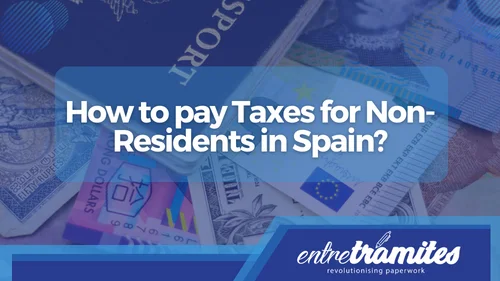One of the fundamental aspects of fiscal taxation in Spain is the distinction between residents and non-residents. This differentiation has significant implications for who should pay taxes and how much must be paid. In this article, we will explore who is considered non-resident in Spain, when they must pay non-resident taxes, and how this tax system works.
Who are considered non-residents in Spain?
In fiscal terms, an individual is considered a non-resident if they have a domicile in Spain but reside in the country for a maximum of 183 days per year. To avoid having to pay taxes or non-resident tax in Spain, three main conditions must be fulfilled:
- Not having residence in Spain. This means that you must not have a main residence in the country.
- Not living in Spain more than 183 days a year. Any day counts, not necessarily consecutive.
- Not having the main primary center of economic or family interests in Spain. This implies that your main economic activities and significant family relationships must be outside of Spain.
Who are considered residents in Spain?
On the other hand, any individual who has a residence in the country and lives a minimum of 183 days during a year will, be considered a resident in Spain, without the condition that these days need to be consecutive.
Tax residency vs. Fiscal address
It is important to define the difference between tax residence and fiscal address. The fiscal address refers to the location where a natural or legal person is responsible for taxation, and does not always match with their registered office. On the other hand, tax residence is used to determine the country in which a person must pay taxes and income.
Do non-residents in Spain should pay taxes?
Any person who resides in Spain and lives there for at least 183 days a year must pay taxes in this country. In addition, there might be situations in which they must pay taxes for specific periods depending on how long they have lived in Spain or another country.
Taxation of non-resident inheritors
When a non-resident person receives an inheritance of a property in Spain, they must pay taxes as a non-resident person, just like any other individual in their situation.
Tax differences between residents and non-residents
The tax differences between residents and non-residents in Spain are significant. Both must have a domicile in Spain, but the key difference is the number of days they spend in the country during a year. This has relevant tax implications because residents must pay tax in Spain for profits made in any country, while individuals considered non-residents only have to pay tax in Spain on profits obtained in this country. All other profits must be taxed in the country of their residence.
In addition, there are differences in tax rates, deductions, and tax percentages between residents and non-residents.
Non-Resident Income Taxes (IRNR)
The IRNR is the tax that people considered non-residents in Spain must pay. In contrast to the Personal Income Tax (IRPF), which only applies to residents, the IRNR has different rates and percentages and only applies when non-residents obtain benefits in Spain, whether from economic activities, pensions, or income from housing. This tax is not required when the profits come from the individual’s country of residence.
IRNR rate for non-residents
The Non-Resident Income Tax rate is not set and depends on the profits earned in Spain, as well as the country of residence of the individual. In Spain, rates range between 19% and 24% on all profits earned in Spanish territory. However, some countries may impose additional fees for profits made in different locations.
What is a tax haven?
Tax havens are territories with low or no taxation where non-residents set their tax domicile to enjoy the benefits of these measures and be taxed in these places instead of in their country of residence. Although tax havens are not illegal, tax avoidance is considered a crime in many places, and most countries are implementing measures to regulate this practice.
The Spanish Tax Administration Agency (AEAT) has established a list of countries and territories of non-cooperative jurisdiction to combat tax evasion.
Double taxation agreement to avoid paying taxes for non-residents
Spain has signed bilateral agreements with most countries to define the link points when it comes to taxation of concepts such as inheritance, donations, purchase and sale of company shares, also the purchase and sale of homes, income from rentals of homes in Spain, and capital gains, among others. These agreements determine which country is in charge of settling taxes. In some cases, it may be necessary to pay taxes in both countries, but the goal is to avoid double taxation by allowing the lesser of the amounts paid in one country or the other to be deducted.
In summary, understanding the difference between residents and non-residents is essential to pay tax obligations in Spain. The Non-Resident Income Tax (IRNR) is a crucial component of this system and affects those who obtain benefits in the country without having fiscal residency. Rates and regulations may vary depending on the individual situation, so it is recommended to look for appropriate tax advice to guarantee the fulfillment of tax obligations in Spain.
Avoid ‘problems’ with the Tax Agency, you can always trust the support of Entre Trámites to help you with the presentation of fiscal and tax procedures for self-employed workers and SMEs. We have specialists ready to help you.
Do you need more information about taxes for non-residents in Spain?
We want to know you and listen to your questions about the procedures you have to do. Count on the advice of our experts to clarify all your doubts. At Entre Trámites we invite you to learn about our services. Fill in our contact form and we will call you to help you as soon as possible, schedule a free online consultation, or simply text our WhatsApp.





